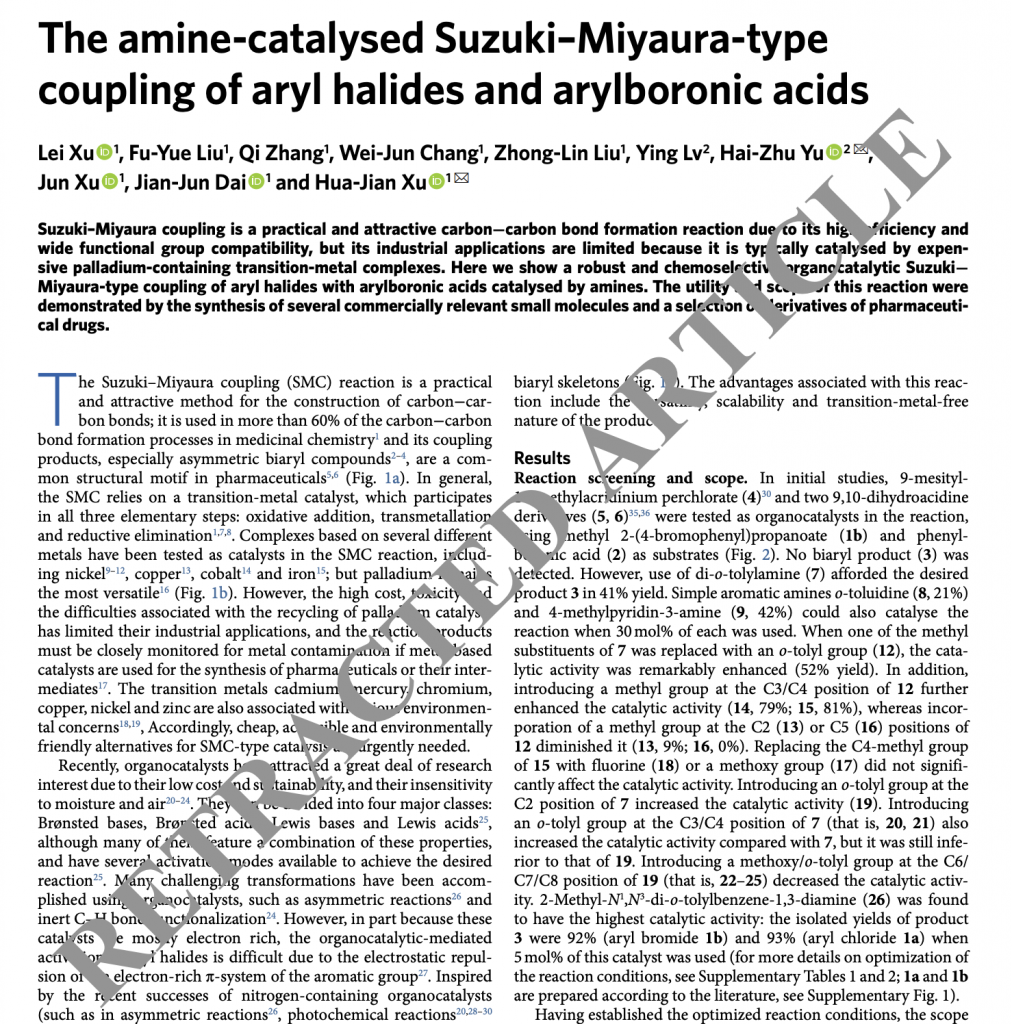
A Nature journal has retracted a 2021 paper which made a bold claim about certain chemical reactions after several researchers raised questions about the analysis – but not before another group pulled their own article which built on the flawed findings.
The first article, “The amine-catalysed Suzuki–Miyaura-type coupling of aryl halides and arylboronic acids,” appeared in Nature Catalysis in January. Most of the authors were affiliated with Hefei University of Technology, in China. The paper has been cited five times, according to Clarivate Analytics’ Web of Science.
After publication, at least three groups of researchers published Matters Arising letters in the journal questioning the validity of the results, all of which appeared on December 2:
- Identifying palladium culprits in amine catalysis
- Fluorometric study on the amine-catalysed Suzuki–Miyaura coupling
- Revisiting the amine-catalysed cross-coupling
Those letters also prompted a blog post in Chemistry World about the problematic papers, which the author, Philip Ball, began, “How important is it that papers published in scientific journals are correct?”
On the face of it, this is just business as usual: a demonstration of science’s self-correcting capacity. Claims that really matter (like this one) are sure to be examined by others, bringing potential flaws to light. Some might ask, though, whether the apparent problems should have been identified during peer review, saving other labs the bother of debunking the work (and the original authors the consequent embarrassment) and keeping the literature free of clutter. A better question, however, is how high the bar should be set before a paper is published. There’s some justification in the common complaint that referees keep asking for one more check after another, some of which require substantial new work, before acceding to publication. And there’s a danger that exciting or important new findings can be delayed or stifled by excessively stringent demands for claims to be made airtight.
Meanwhile, the journal waited to retract the paper for nearly another week. Here’s the notice, which appeared on December 8:
We wish to retract this article as we can no longer claim that the observed reactivity for the Suzuki-Miyaura-type coupling of aryl halides and arylboronic acids is attributed to the amine organocatalyst. Efforts from different laboratories—published in the form of Matters Arising articles1,2,3—have pointed to the fact that the reaction is catalyzed by residual palladium impurity contained in the amine. We have performed a series of validation experiments confirming that during the synthesis of the amine, stable palladium complexes are formed, which could not be completely removed by column chromatography. Moreover, the ICP-MS method we used could not completely digest the residual palladium. Such factors led us to misjudge the nature of the catalyst.
We are very grateful to the authors of the Matters Arising articles for raising these issues. We sincerely apologize to the scientific community for any confusion arising from our publication. All authors agree with this retraction.
Questions about the paper prompted the removal of another paper by different authors who’d cited the Nature Catalysis article. This one, “Transition-metal-free synthesis of conjugated microporous polymers via amine-catalyzed Suzuki–Miyaura coupling reaction,” appeared in Chemical Science, a journal of the Royal Society of Chemistry.
According to the notice, issued November 30 (in other words, more than a week before Nature Catalysis retracted its article):
We, the named authors, hereby wholly retract this Chemical Science article. This article reports the synthesis of conjugated microporous polymers using an amine-catalyzed Suzuki–Miyaura coupling reaction. This article builds upon findings first reported by Xu et al.1 and invokes the same mechanism for Pd-free polymer synthesis. Since the publication of our article in Chemical Science, we have been made aware of concerns regarding the conclusions of the above-mentioned Nature Catalysis article, disputing the mechanisms and claims that the reactions reported are not Pd-free.2,3 We, as the authors of this Chemical Science article, have considered these claims and, after further investigation, acknowledge that we cannot exclude the influence of residual Pd for the Suzuki coupling reaction involved. Therefore, there is sufficient doubt around the main conclusion of our work as a ‘transition-metal-free synthesis’ and so we wish to retract this article.
Matthew Kitching, a chemistry researcher at Durham University, in the UK, and a co-author of one of the Matters Arising letters, told us:
the main concern we had with the work was that palladium-free type processes similar to that reported in the Nature Catalysis paper have been previously reported in the literature, and virtually always have been found to be catalysed by trace quantities of transition metals. The work by Yu and Xu contains sensible control experiments, but these had the potential to give false negatives. If the process was truly metal free it would have been game changing – unfortunately the teams lead by Yu and Xu were exceptionally unlucky in that the active catalyst is remarkably stable, surviving both purification and digestion experiments.
Kitching added that the journal was:
highly professional, but the process seems to take a long time. For me, I’m not sure if the matters arising process is the best method to correct the literature. The process has taught me how useful preprinting your article can be in getting important results out in a timely manner.
Like Retraction Watch? You can make a one-time tax-deductible contribution by PayPal or by Square, or a monthly tax-deductible donation by Paypal to support our work, follow us on Twitter, like us on Facebook, add us to your RSS reader, or subscribe to our daily digest. If you find a retraction that’s not in our database, you can let us know here. For comments or feedback, email us at [email protected].
